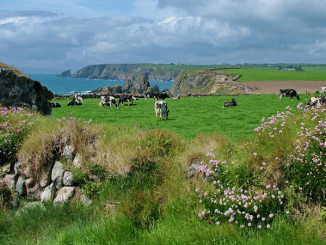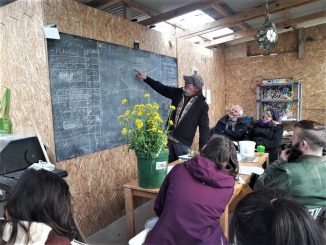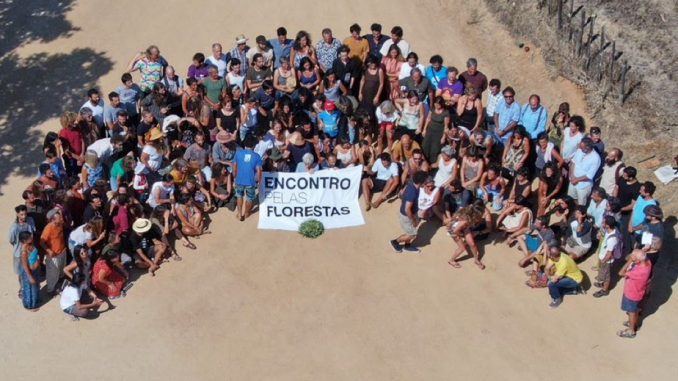
The 2017 wildfires in Portugal burned some 442 thousand hectares of land and claimed 114 lives according to ICNF statistics. From the ashes of this devastation rose Reflorestar Portugal, a national network for forest and ecosystem regeneration. “It’s an initiative and citizenship driven by the collective dream of seeing Portuguese forests reborn with human presence and collaboration”, says Susana Guimarães, general coordinator of Reflorestar Portugal. The idea is to empower individuals and local communities to act, and to make people aware of their deep relationship with ecosystem regeneration and food production systems.
Reflorestar Portugal focuses on values of resilience, autonomy and creativity. To build trust and a sense of community between its members, and help them work together with an “open heart”, it hosts the “Encontro pelas Florestas” gathering every two years. In this interview for ARC2020, Susana Guimarães speaks to Antonieta Lopes about empowering local communities to be guardians of the forest, moving from an extractive to a regenerative economy, and letting go of what has proven to be of no use to us.
What are the biggest problems that forests are facing in Portugal?
One of the biggest threats is the depopulation of the country’s interior and the lack of long-term strategic investment in rural Portugal. Human populations and communities are fundamental in protecting the forest, but they only stay in the territory if their needs are answered. This leads us to questions that go hand to hand with the protection of the forest, namely the local economy and regional politics.
Another major problem is legislative and structural, such as the framing of private property in our country. A long-term national strategy is urgent, with the commitment of all parliamentary parties, for the imposition of both obligations and direct support to landowners.
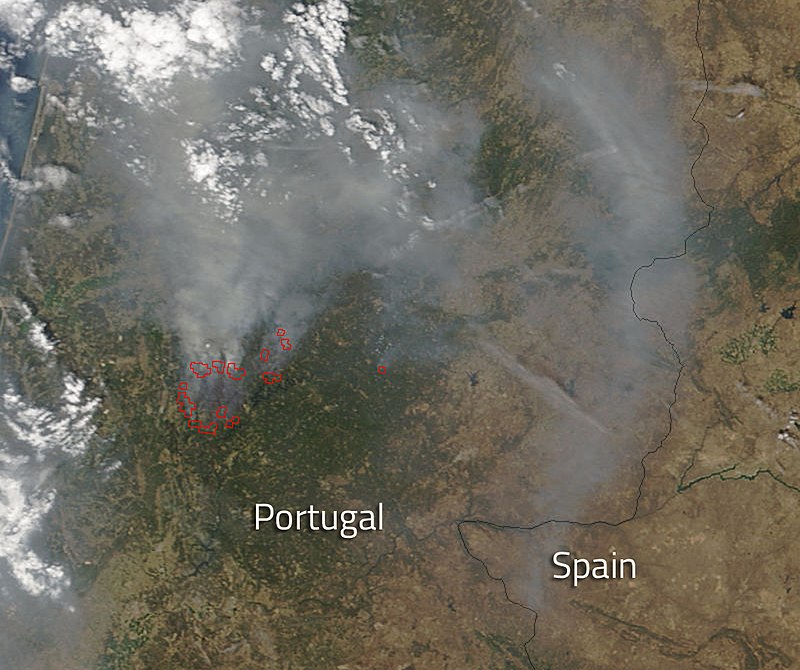
We urgently need political will and awareness regarding the recovery of national ecosystems. Instead, we continue to see attacks, such as the attempts to prospect for lithium in rural Portugal. This activity destroys not only fragile ecosystems, fauna and populations, but also pollutes and consumes air and groundwater. These are natural resources and should never be considered as mere economic products.
These are natural resources and should never be considered as mere economic products.
At this moment, the forest needs a uniform public investment action and must be considered with seriousness and urgency as a national sovereignty subject.
As a “cherry on the top of the cake” we have a paradigmatic problem: the “lenses” with which we look at the forests. They aren’t a monoculture or a product, so they cannot be used or legislated for as such. The businesses that depend on forests should never have a negative impact on them – and on the surrounding populations – without being responsible, to the same extent and dimensions, for their immediate and continuous regeneration.
It is possible to have forest products in a biodiverse forest, but it is necessary that all agents involved (community, politicians and enterprises) change their “lenses” from extraction to regenerative economy.

And how do you see the future of our forests?
I foresee the forests going back to what they were for thousands of years because it is the only possible way for sustainable life on the planet. They are the heart of the water cycle and the balance between oxygen and carbon dioxide in the atmosphere. They maintain the humidity of the air and soils and they provide shelter, food and a source of energy for humans and terrestrial animals.
But this only happens when we have biodiverse forests, where natural stratification and succession are allowed. Thus, I foresee a change in the paradigm, in the “lenses” with which humans look at forests. Our communities will once again be guardians of the forests, protecting their seeds and plants, planting their own food and creating local economies around this organism that pulsates and sustains life. I believe, therefore, that this path passes through agroforestry, since it allows the presence of human beings in the territory, stimulating the forest itself.
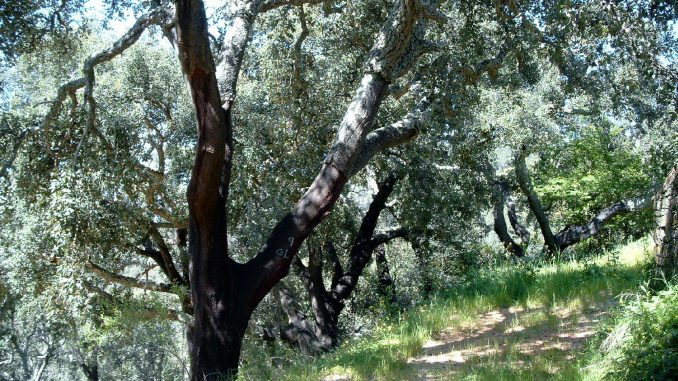
If you were part of government, what would be the first steps you would take?
All measures require a strengthening of the public workforce, financial and educational assistance:
- Review forest and agricultural property to allow the design and application of a national and regional strategy;
- Restore jobs for forest and river guards;
- Ban harrowing soil as annual maintenance – it should only be allowed at the time of the first intervention on land destined for ecosystem regeneration and food production;
- Develop a national policy to implement productive soil regeneration directly supporting landowners, farmers and also the local municipalities so that they facilitate access to the necessary materials, machinery and labour;
- Ban the burning of organic matter which, in addition to the risk of fire, is an atrocious attack on soil and a loss of energy, promoting the release of CO2 into the atmosphere, instead of returning it where it belongs – to the soils and plants that grow from it;
- Suspend “land clearing” concept and policies, redoing the legislative measures to change the practices and paradigm for forest regeneration and maintenance. For example, annual maintenance would become mandatory, with pruning, crushing and deposition in the soil of organic matter to stimulate vegetative growth, as well as the most diverse annual sowing, in each property, supporting native species stimulation, soil cover and food. They would be gradual measures, where obligations would be accompanied by support and training. It is urgent to know how to prune correctly…
- Change the government organizational structure, merging the Ministries of Agriculture and Forest because dialogue and intersection between these areas is essential and they should never be separated;
- Develop a national strategy of financial and structural support for ecological literacy and dissemination of information to the entire population, with a focus on: native forest and Creole food seed defence and preservation; understanding of water and soil cycles; and seed identification and harvesting;
- Develop a national programme of municipal seed nurseries, with civic participation and financial support for their maintenance, so that each region could make abundant vegetative material available for local ecosystem regeneration;
- Last but not least, the progressive – urgent – transition from monoculture to polyculture, restricting monoculture in forestry areas, until prohibition. A temporary measure would be to implement mandatory assurances – with retroactive effects for plantations up to X years old – that guarantee land regeneration on monoculture profiles, when cutting them.
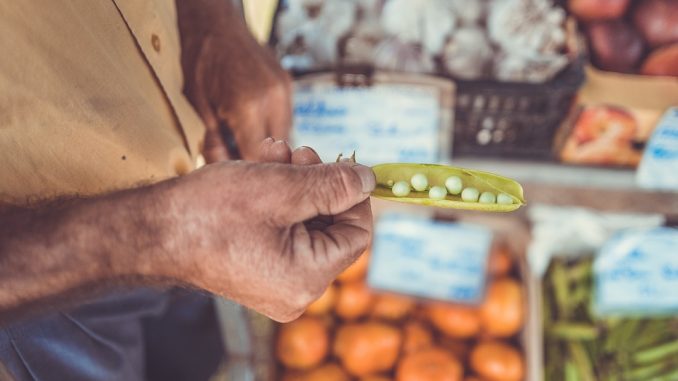
Regarding the current COVID-19 crisis, how do you think it will affect the future of agriculture and forests?
I think that all investment in agricultural and forestry areas should be immediately reinforced, expanded, unbureaucratic, made more flexible and facilitated in order to reach more players. Since the 80s, what happened is that the government only complied with European standards to receive financial aid, with no serious strategy in time and space, which causes a huge loss of resources and a discontinuity in the natural regeneration processes.
We also have to be flexible and aware of conceptualizations. An example of where this is lacking is the difference between the concept of Agroforestry that we practice at Reflorestar Portugal, and the Agroforestry that public institutions address and legislate for. This brings serious problems in the field. The promotion of biodiversity and the research of different processes is urgent, so that the common objective – the regeneration of ecosystems – is achieved regardless of the techniques applied. This objective should be what unites us, making us flexible and in constant action.
The difference between the concept of Agroforestry that we practice at Reflorestar Portugal, and the Agroforestry that public institutions address and legislate for, brings serious problems in the field.
Crises like the one we are facing right now make very clear that with regard to natural resources – soil, forest, air, water – and food, countries must be sovereign, autonomous and invest in their own regeneration, conversion and protection. They also serve to reflect and realize what is essential for life – Water and Air (Forest and Oceans), Soil (food), Shelter and Love – and all these factors lead to healthy ecosystems and also healthy bodies and immune systems.
Our health depends on the health of ecosystems, where water, air, food and shelter come from, allowing us to live in Love and not in permanent stress, fear and scarcity. That said, what are we waiting for? It should be clear where all countries individually – and Europe as a whole – should focus their investment, innovation and aid efforts (educational, direct, legislative, financial, research, etc.).
We must let go of what has proven to be of no use to us. Crises are also opportunities to start over differently and this one is an unparalleled opportunity as it is happening worldwide. May the essence of all this restructuration be the regeneration of Health, Ecosystems and the Human Being.
This interview has been edited for clarity.
More on forests and farming
Farm Diversification – Agroforestry and Agritourism in Ireland
Scotland | Organic Farming, Agroforestry Best for Emissions Reductions
Forest Grabbing in Romania is destroying pristine nature and rural livelihoods
Climate Chaos and Land Use: Act Now or Face Irreversible Losses
Czech Republic | “No Forests, No Water, No Future” – Part I: Bugs in the Ecosystem
Czech Republic | “No Forests, No Water, No Future” – Part II: Moving On from Monocultures



